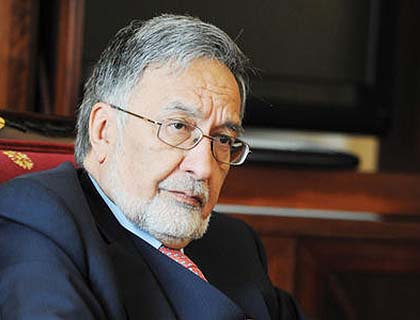KABUL - Foreign Minister Zalmai Rassoul on Thursday told a special United Nations Security Council (UNSC) meeting on Afghanistan that his nation was increasingly taking full charge of its destiny.
"The Afghan people are inspired by the prospect of a future free from violence and war. And thanks to our joint efforts, important progress towards that endeavor continues," Rassoul said in his address to the UNSC meeting on the situation in Afghanistan in New York.
"As we speak, Afghanistan has surpassed the halfway point on our transition to full security responsibility. With the commencement of the third tranche of security transition in May, 75 percent of the country will be under Afghan security responsibility by the end of November," he said.
Rassoul said their progress was on track to complete security transition by the end of 2013. The Afghan army and police are showing more resilience and effectiveness, as they take more and more responsibility in meeting the country's security needs," he continued.
However, he said sustainability of the Afghan National Security Forces was inextricably linked to the international community's long-term support.
He welcomed NATO's decision to develop a new "training, advising and assistance" role, which will take effect in 2014.
The FM said the Afghan people were encouraged by the international community's assurance to help them secure peace and prosperity throughout transition, and the transformation decade (2015-2024).
" We expect the international community to meet its commitment in channeling assistance through our core budget, and aligning its aid with the Afghan National Priority Programs," he said.
He said combating corruption, strengthening governance, and consolidating the rule of law would remain key priorities for the Afghans. "President Karzai's decree of July of this year is a significant step forward in our counter-corruption efforts," he said.
Rassoul said Afghanistan was regaining its legitimate place in the region and the world through playing an active role within the neighborhood and international community.
"Our multilateral agreements and strategic partnerships involve long-term commitments between Afghanistan and our international partners," he said.
"The partnerships we have formed both within our neighborhood and beyond are essential to preserving the historic achievements of Afghanistan's young democracy and securing the future peace and stability of the country," he said.
He said bold steps had been taken toward strengthening Afghan sovereignty and national ownership, with the enemies of Afghanistan continuing to make desperate attempts to undermine their progress towards a brighter future.
"Terrorist attacks have been increasingly inflicted on families and innocent Afghan men and women and children in many parts of the country, putting a brutal and tragic halt to their peaceful lives," he said.
"Undoubtedly, the unremitting violence plaguing Afghanistan is the result of the continued military, financial and ideological support enjoyed by terrorists, and the presence of sanctuaries and safe-havens outside our borders," he said.
He said as the fight against terrorism continues, the next few years were vital with regard to political and security transition in Afghanistan for a stable future. "We are working diligently to ensure a fruitful result of peace and reconciliation efforts underway. Our inclusive peace and reconciliation process seeks to build trust and confidence among all Afghans," he said.
He said they were determined to bring to the folds of society elements of the armed opposition willing to renounce violence, cut ties with terrorist groups, and accept the Afghan constitution.
"The High Peace Council has revitalized its approach to reconciliation efforts. The international community and our region have an important part to play," he said. Insisting the role of the UN Security Council would be imperative to this process. (Pajhwok)

